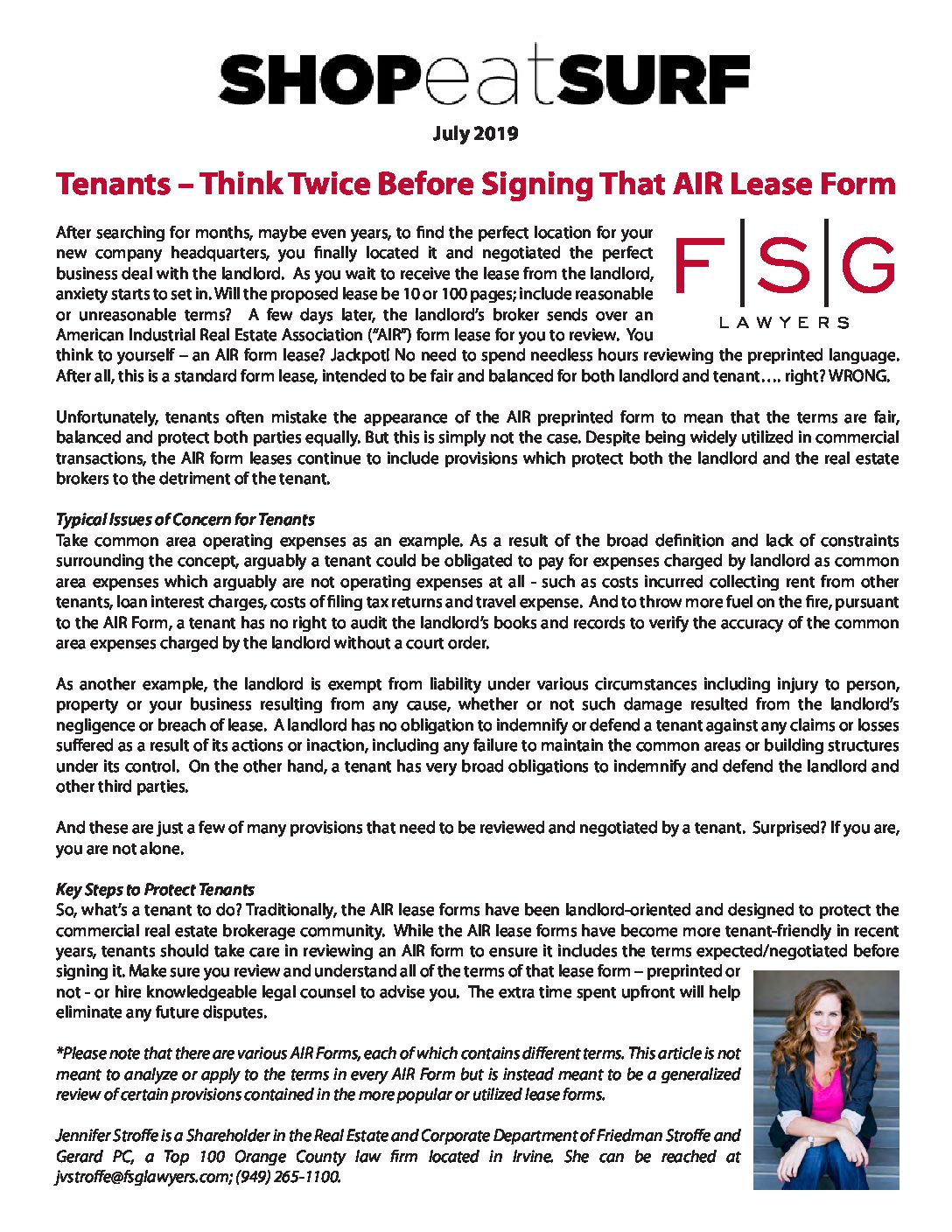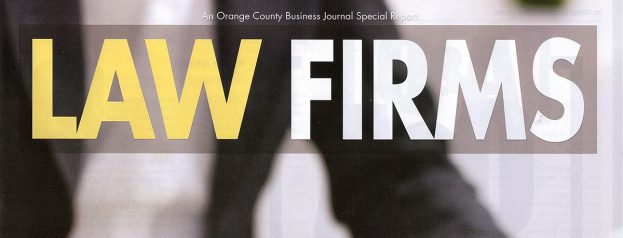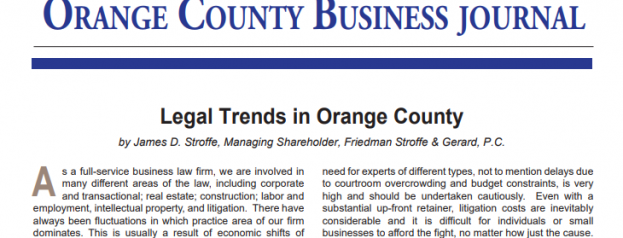Recent News
- Jennifer Stroffe selected to “Southern California Super Lawyers”
- Article – Commercial Evictions Update – Is Your Business Protected?
- Article – Tenants – Think Twice Before Signing That AIR Lease Form*
- Article “Agreements with Sales Representatives”
- Misclassification of an employee or a contractor can have severe tax and other consequences for the employer.
- Article “Classifying Workers: Contractors or Employees?”
- Friedman Stroffe & Gerard, P.C. again selected as one of “Top Orange County Law Firms”
- FSG’s Jim Stroffe featured in Orange County Business Journal’s “Law Firms Special Report”
Recent News
FSG LAWYERS is pleased to announce the selection of Jennifer Stroffe, shareholder, to the 2021 edition of “Southern California Super Lawyers,” an honor awarded to only 5% of lawyers statewide. Congratulations Jennifer!
* As published in “Shop-Eat-Surf,” October 21, 2020
On August 31, 2020, the California Legislature passed, and Governor Gavin Newsom signed into law Assembly Bill 3088, more commonly known as the COVID-19 Tenant Relief Act of 2020 (“CTRA”). Among other things, the CTRA enacts substantial new protections from evictions for all California residents, including prohibitions on evicting tenants who have failed to make specified rental payments due to the COVID-19 pandemic provided certain requirements are met. However, the CTRA protections are restricted to the residential arena and it does not enact protections for commercial tenants.
Do not worry commercial tenants, not all it lost. On September 23, 2020, Governor Gavin Newsom signed Executive Order N-80-20 (the “Executive Order”) extending authorization for local governments to halt evictions for commercial renters impacted by the COVID-19 pandemic through March 31, 2021. Although the CTRA does not provide protections to commercial tenants, the Executive Order prolongs the authority of counties and cities state-wide to continue to enforce their own protective measures for their commercial tenants struggling with the financial burdens imposed upon them by the COVID-19 pandemic.
Such safeguards afforded to commercial tenants by local ordinances vary by county and city and may include protections such as: placing a moratorium on evictions for commercial tenants who have incurred financial hardships due to COVID-19 and prohibiting a landlord from increasing rent, charging late payment fees, and/or charging interest on the unpaid rent. Many of these ordinances also provide for repayment of unpaid rent during a specified time (usually 6-12 months) after a triggering event (e.g. expiration of the Executive Order or the lifting of a “state of emergency”). Further, an ordinance may also prohibit a landlord from evicting a commercial tenant during the repayment term, provided the commercial tenant is making repayments.
Local ordinances may have their own expiration dates not tied to the expiration of the Executive Order (e.g. they could expire prior to March 31, 2021). Given this ever-shifting legal landscape, it is critical to know your own county and city’s laws regarding this matter to ensure you and your business’ rights are protected. If you need assistance in this area or with any other commercial leasing matters, contact Jennifer Stroffe, Shareholder at FSG LAWYERS PC – 949.265.1100.
This article is for informational purposes only and not for the purpose of providing legal advice. You should contact legal counsel to obtain advice with respect to your particular issues.
Jennifer Stroffe is a Shareholder in the Real Estate and Corporate Department of Friedman Stroffe and Gerard PC, a Top 100 Orange County law firm located in Irvine.
* As published in “Shop-Eat-Surf,” July 2019
After searching for months, maybe even years, to find the perfect location for your new company headquarters, you finally located it and negotiated the perfect business deal with the landlord. As you wait to receive the lease from the landlord, anxiety starts to set in. Will the proposed lease be 10 or 100 pages; include reasonable or unreasonable terms? A few days later, the landlord’s broker sends over an American Industrial Real Estate Association (“AIR”) form lease for you to review. You think to yourself – an AIR form lease? Jackpot! No need to spend needless hours reviewing the preprinted language. After all, this is a standard form lease, intended to be fair and balanced for both landlord and tenant…. right? WRONG.
Unfortunately, tenants often mistake the appearance of the AIR preprinted form** to mean that the terms are fair, balanced and protect both parties equally. But this is simply not the case. Despite being widely utilized in commercial transactions, the AIR form leases continue to include provisions which protect both the landlord and the real estate brokers to the detriment of the tenant.
Typical Issues of Concern for Tenants
Take common area operating expenses as an example. As a result of the broad definition and lack of constraints surrounding the concept, arguably a tenant could be obligated to pay for expenses charged by landlord as common area expenses which arguably are not operating expenses at all – such as costs incurred collecting rent from other tenants, loan interest charges, costs of filing tax returns and travel expense. And to throw more fuel on the fire, pursuant to the AIR Form, a tenant has no right to audit the landlord’s books and records to verify the accuracy of the common area expenses charged by the landlord without a court order.
As another example, the landlord is exempt from liability under various circumstances including injury to person, property or your business resulting from any cause, whether or not such damage resulted from the landlord’s negligence or breach of lease. A landlord has no obligation to indemnify or defend a tenant against any claims or losses suffered as a result of its actions or inaction, including any failure to maintain the common areas or building structures under its control. On the other hand, a tenant has very broad obligations to indemnify and defend the landlord and other third parties.
And these are just a few of many provisions that need to be reviewed and negotiated by a tenant. Surprised? If you are, you are not alone.
Key Steps to Protect Tenants
So, what’s a tenant to do? Traditionally, the AIR lease forms have been landlord-oriented and designed to protect the commercial real estate brokerage community. While the AIR lease forms have become more tenant-friendly in recent years, tenants should take care in reviewing an AIR form to ensure it includes the terms expected/negotiated before signing it. Make sure you review and understand all of the terms of that lease form – preprinted or not – or hire knowledgeable legal counsel to advise you. The extra time spent upfront will help eliminate any future disputes.
** Please note that there are various AIR Forms, each of which contains different terms. This article is not meant to analyze or apply to the terms in every AIR Form but is instead meant to be a generalized review of certain provisions contained in the more popular or utilized lease forms.
Jennifer Stroffe is a Shareholder in the Real Estate and Corporate Department of Friedman Stroffe and Gerard PC, a Top 100 Orange County law firm located in Irvine. She can be reached at jvstroffe@fsglawyers.com; (949) 265-1100.
Most manufacturers sell their products using the services of independent sales representatives. Manufacturers need to be aware of the fact that some 35 states in the United States and Puerto Rico have passed legislation designed to ensure that independent sales representatives are paid commissions in a timely fashion in the same way that regular employees would be paid salaries by an employer. These laws potentially expose the manufacture to severe risks and penalties in a dispute with an independent sales representative.
The laws vary from state to state. In Puerto Rico if the sales representative is the exclusive representative on the island, on termination he is entitled to a termination payment for the goodwill created taking into account the length of service, business growth, marketing efforts, etc. Typically, the statutes provide for payment of double or triple damages plus the attorney’s fees and court costs by the manufacturer in the event of a dispute with a sales representative over timely payment. For this reason manufacturers should try to limit exposure by having a written contract with the sales representative that is clear and specific so as to reduce the possibility of a payment dispute. The commercial issues to make clear include at least the following – (i) how commission is calculated; (ii) when it is deemed to be earned (on order, delivery or payment); (iii) when commissions are payable; and (iv) most importantly, what and when commissions are payable and paid once the relationship is terminated.
Some states allow the parties to agree in the contract as to those items, but not all. As an example, New Jersey specifies that commission is payable on orders received by the manufacturer by the time of termination, even if the order is only accepted later, delivered or paid for after termination. Minnesota prohibits termination of a sales representative without “good cause” and the sales representative must be given at least 90 days to cure. There are also several states including California, Maryland and Pennsylvania which make any provision in a contract purporting to waive sales representative’s rights under the applicable statute void and contrary to public policy and subject any such disputes to the jurisdiction of the sales representative’s state.
Ideally a manufacturer should carefully evaluate the laws applicable when hiring a sales representative and give special consideration to the issues referred to above. Even if it is not practical to fully evaluate on a state by state basis, it would still be preferable for a manufacturer to have a standard agreement dealing with the financial issues rather than have the terms of the relationship be uncertain.
The contents of this article are intended for general information purposes only and should not be construed as a professional opinion on any specific facts or circumstances. Professional advice should be consulted with regard to specific application of the information on a case by case basis.
Bryan Friedman is a shareholder at Friedman Stroffe & Gerard, P.C. in Irvine, California. He is a shareholder of Friedman Stroffe & Gerard, P.C. and chairs the firm’s Corporate and Business Practice Group. Contact him at bfriedman@fsglawyers.com or 949.265.1106.
When hiring workers, employers sometimes choose to classify the worker as an independent contractor rather than an employee, either in the belief that it is less expensive or burdensome for the employer or at the potential worker prefers to be treated as independent contractors rather than as an employee for personal reasons or to potentially delay or avoid payment of taxes.
For employees, the employer must withhold and remit income and employment taxes from wages or salary paid to the employee to the taxing authority, including an additional employer contribution. Each year the employer is required to issue IRS Form W-2 to each employee specifying the amount earned and the taxes withheld during the prior year.
There is no requirement for withholding or remitting taxes for independent contractors and the employer is only required to issue IRS Form 1099 to the independent contractor if the amount paid during the year was $600 or more. Moreover the independent contractor is generally not entitled to any benefits available to employees.
However, the tax withholding and reporting obligations for employees or independent contractors are substantially different and wrongful misclassification of an employee or a contractor can have severe tax and other consequences for the employer. The employer could be liable for payment of the taxes that should have been withheld in addition to the employer’s share of the employment taxes, interest on those taxes and possibly penalties. In addition the employers could be subject to a class action lawsuit arising from the misclassification on behalf of all workers misclassified over several years. The resulting liability could be substantial and devastating.
The relevant factors necessary to determine whether a worker should be classified as an employee or an independent contractor include whether the worker was engaged in a separately established occupation or business; whether the worker could be discharged at any time without cause; the skill required to perform the services and accomplish the desired result; whether the worker or the service recipient supplied the tools, equipment, and place of work; whether the work was an isolated event or continuous in nature; whether the work was part of the hiring entity’s regular business; and the relationship the employee or independent contractor believed that they were creating. Almost every case is unique and turns on its specific facts, but the principal relevant fact has been whether the hiring entity had the ability to control the “manner and means” or the details as to how the worker completed the work.
The risk of a wrong classification has been simplified (and restricted) by the recent matter of Dynamex Operations West, Inc. v. The Superior Court of Los Angeles County decided in the California Supreme Court. Dynamex was not decided in the context of an income or employment tax dispute, but rather in the context of a California Industrial Welfare Commission wage order which is arguably not applicable in determining a worker’s status for tax purposes. However it is likely that the California Employment Development Department, which oversees worker classification issues for California income and employment tax purposes, will refer to Dynamex when making a determination as to the employment status of a worker.
Dynamex articulates an “ABC” test to determine whether a worker is an employee or an independent contractor. The “ABC” test provides that a worker is properly classified as an independent contractor if the hiring entity can establish that: (A) the worker is free from the control and direction of the hiring entity in connection with the performance of the work, both as provided in the underlying contract and in fact; (B) the worker performs work that is outside the usual course of the hiring entity’s business; (C) the worker is customarily engaged in an independently established trade, occupation, or business of the same nature as the work performed for the hiring entity.
Under these requirements almost all workers would likely be classified as an employee because of the requirements of the “B” test unless the worker is truly outside the scope of the hiring entity’s business. A contractor providing plumbing services to an apparel manufacturer would fit that provision. However a contract clothing designer may not. Likewise, a contract attorney providing legal services for a law firm would almost certainly be classified as an employee.
Employers would be well advised to closely examine the legal ramifications when determining the classification of workers and seek legal advice if there is any doubt. The consequences of an incorrect classification could be extremely problematic.
Bryan Friedman is a shareholder at Friedman Stroffe & Gerard, P.C. in Irvine, California. He is a shareholder of Friedman Stroffe & Gerard, P.C. and chairs the firm’s Corporate and Business Practice Group. Contact him at bfriedman@fsglawyers.com or 949.265.1106.
The contents of this article are intended for general information purposes only and should not be construed as a professional opinion on any specific facts or circumstances. Professional advice should be consulted with regard to specific application of the information on a case by case basis.
For the 3rd year in a row, FSG has been selected by the Orange County Business Journal for its annual list of the top law firms in Orange County. Over 1,000 law firms, comprising over 16,000 attorneys, operate in Orange County, so ranking in the Top 100 is significant.
Jim Stroffe was selected to provide his perspective in a Q&A section of the Orange County Business Journal’s “Law Firms Special Report” on March 19, 2018. Jim discussed legal trends relating to the real estate industry, employment, business litigation, and other topics in his Q&A article.
The Business Journal’s Peter Brennan asked some of Orange County’s top attorneys for their views.
FSG partners Robert Gerard and Bryan Friedman attended the 2017 “Waterman’s Ball” on August 5th at The Ranch in Laguna Beach, hosted by the Surf Industry Manufacturers Association (SIMA) .
The event raised money to support 19 ocean environmental organizations and is spearheaded by the SIMA Environmental Fund. This year’s honorees included Waterman of the Year Bethany Hamilton, Environmentalist of the Year Cyrill Gutsch, and Lifetime Achievement Award Winner Herbie Fletcher. SIMA also recognized Fernando Aguerre, President of the International Surfing Association, with a special award for his tireless – and successful – quest to get surfing into the Olympics.
See more details at: https://www.shop-eat-surf.com/content/photos-from-the-28th-annual-watermans-ball
FSG has once again been selected by the Orange County Business Journal for its annual list of the top law firms in Orange County.
FSG first submitted the survey data in 2016 and the firm was immediately selected, ranking #76 in FSG’s first year on the list. FSG moved up to #74 on the 2017 list. The list is compiled by Orange County Business Journal staff through surveys distributed to and completed by local law firms. Over 1,000 law firms, comprising over 16,000 attorneys, operate in Orange County, so ranking in the Top 100 is prestigious.
IRVINE, CA, January 16, 2017 — Richard W. Millar, Jr. has joined Friedman Stroffe & Gerard, P.C. (“FSG”) as Of Counsel. Millar will work in FSG’s Litigation and Real Estate & Construction groups. FSG is a leading transactional and litigation law firm based in Irvine.
Millar has been a practicing attorney in California for approximately 50 years. He is well-known in the Orange County legal community as a top litigator and as a regular columnist for “Orange County Lawyer Magazine” (official publication of the Orange County Bar Association) with over 160 articles published. Millar’s practice is primarily business, real estate, and construction litigation. Over the years, he has been hired by almost every title insurance company operating in Southern California to litigate real estate title issues. He has tried over 100 cases to verdict and handled over 50 Appeals. Millar has represented owners, general contractors, and subcontractors in a wide variety of construction disputes.
Millar has received Martindale-Hubbell’s A-V rating for 35 years. The A-V rating is the highest rating possible for both legal ability and ethics. He has a 10 AVVO rating and is listed in Who’s Who in the World, Who’s Who in America, and Who’s Who in American Law.
In 2015, Dick received the Franklin G. West Award from the Orange County Bar Association, which is the Bar’s highest award presented to an outstanding attorney or judge who has advanced justice and the law.
Millar served for several years on the Orange County Superior Court’s Arbitration and Mandatory Settlement Conference panels. He has also acted as a private mediator. He has served as an expert witness in the Orange County Superior Court in attorney malpractice actions as well as attorney fee disputes. Millar started his legal career in Los Angeles, first as a law clerk and then as Deputy District Attorney in the Los Angeles District Attorney’s Office. He then moved into private practice and for the last 35 years was a partner at a prominent Orange County firm. Millar received his J.D. from the University of San Francisco. His memberships have included the American Bar Association, American Bar Foundation, Orange County Bar Association, Peter Elliot Inn of Court, and the Association of Business Trial Lawyers. In 2002, Millar served as President of the Orange County Bar Association, which is one of the largest Bar Associations in America.
“We are very pleased to have Richard join our firm,” says James D. Stroffe, managing shareholder. “His stellar reputation and vast experience in litigation will be a tremendous asset in serving FSG’s clients. Also, having Richard join us makes FSG the only law firm in Orange County that has two former Orange County Bar Presidents in the same firm (Robert Gerard was the Bar President in 2003).”





